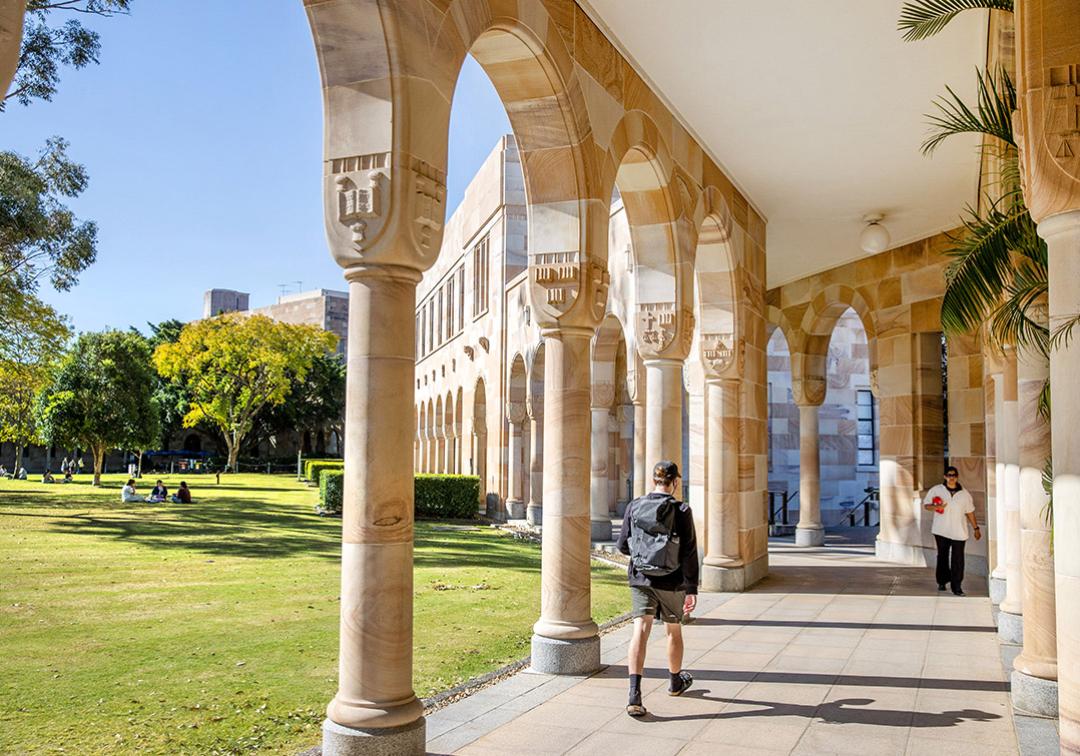
Master of Geographic Information Science
Overview
Master the geospatial data skills to advance your career in ecology, exploration, health, planning, maths, cartography, surveying, geography or environmental science.
Study advanced areas of Geographic Information Science (GIS) and choose from electives including spatial analysis, remote-sensing, web mapping and related professional skills development.
Access specialist laboratories that feature the latest applications for GIS, remote-sensing, automating geospatial tasks with programming, and web map publishing.
Use online GIS data and applications for key national data such as the population census, Earth observation and national mapping services for society and the environment, to gain a comprehensive understanding of these applications across many sectors.
During the latter part of your master’s studies, you'll also have the opportunity to undertake a semester-long GIS and/or remote-sensing research project, where you'll gain practical field-related experience while enhancing your report writing and project management skills.
You’ll graduate with advanced computing skills in GIS software, competence in GIS and remote-sensing operations, and sought-after project implementation and management skills.
Program highlights
- Access specialist laboratories featuring the latest applications.
- Study advanced areas of GIS and choose electives to match your career ambitions.
- Undertake a semester-long GIS and/or remote-sensing research project.
- Graduate with advanced computing, implementation and management skills.
How you'll learn
Your learning experiences are designed to best suit the learning outcomes of the courses you choose.
- Lectures
- Tutorials
- Research experience
- Fieldwork
What you'll study
At UQ, degrees are called 'programs' and subjects are called 'courses'. Here's a sample of the courses you could study in this program:
- Geographical Information Systems
- Environmental Problem Solving
- Spatial Analysis & Modelling
- Landscape Ecology
- Data Management & Statistical Computing
- Analysis of Scientific Data
Career possibilities
Postgraduate study can take you anywhere. Here are some of the careers you could be on your way to:
- Regional planner
- Built environment consultant
- Environment and resource manager
- Mineral exploration consultant
- Geospatial application developer
- Environmental researcher
- Cartographer
- Web map publisher
- Landscape modeller
- Ecologist
Average annual salary range
Urban Planner
seek.com.au
Average annual salary range
Geographic Information System Officer
seek.com.au
Next steps after graduation
Spatial information science graduates leave us with skills that extend across disciplines and professions, including ecology, archaeology, mineral and oil exploration, health, urban and regional planning, mathematics, cartography, surveying, environmental science, and more.
Graduates of this program are professionally qualified in the field of geographic information science and can apply the techniques of management and analysis of geographic information to a range of discipline areas, which can lead to careers in local, state and federal governments, semi-government agencies, private industry and research institutions.
Events
See all events
29 June - 6 July
Year 11 Queensland Chemistry Winter School

29 June
Queensland Biology Winter School, Year 12

1 July
International Baccalaureate Research Skills Program
Stories
See all stories
Study tips
Why now is the perfect time to do postgrad study
3-minute read
Stories
See all stories
UQ people
Rebuilding the reef: How Tania’s research is helping to save our oceans
5-minute read
Entry requirements
Entry requirements
It's possible to complete this degree in 2 years or 1.5 years depending on your qualifications and experience.
You can apply for any duration as long as you meet the entry requirements. You may also be eligible to apply for credit or exemptions to shorten your degree further. You'll graduate with the same qualification no matter how long you take to complete the degree.
2-year degree (32 units of study)
To be eligible to complete the degree in 2 years full-time (or part-time equivalent)full-time (only available as full-time study), you'll need:
- a bachelor's degree (or equivalent) in any discipline, or
- a graduate certificate or graduate diploma in geographic information science, or
- to have successfully completed at least 3 years of study towards an approved qualification at an overseas partner institution, with a formal pathway to the Master of Geographic Information Science.
You must have a grade point average (GPA) of 4.5 on a 7-point scale in your previous qualification.
1.5-year degree (24 units of study)
If you have relevant prior learning or experience, you can reduce the number of courses you need to complete and graduate in less time.
To be eligible to complete the degree in 1.5 years full-time (or part-time equivalent)full-time (only available as full-time study), you'll need:
- a bachelor's degree (or equivalent) in a relevant discipline (see below), or
- to have successfully completed at least 3.5 years of study towards an approved qualification at an overseas partner institution, including research requirements, with a formal pathway to the Master of Geographic Information Science.
You must have a grade point average (GPA) of 4.5 on a 7-point scale in your previous qualification.
Relevant disciplines for previous qualifications
Relevant disciplines include science (mathematics, physics, computer science), environmental science, environmental management, geographical science, geology, surveying, geometrics and engineering.
Related programs
Depending on your previous qualifications and current goals, you might want to consider
one of these related programs:
English language requirements
IELTS overall 6.5; reading 6; writing 6; speaking 6; listening 6. For other English Language Proficiency Tests and Scores approved for UQ
TOEFL iBT (including Paper Edition) - Overall 87, listening 19, reading 19, writing 21 and speaking 19.
PTE Academic - Overall Score of 64 and 60 in all sub bands.
BE - A minimum overall grade of 4 plus a minimum grade of C in all macro skills.
CES - Overall 176 and 169 in all sub bands.
OET is not accepted.
There are other ways to meet the English language requirements. For some programs, additional conditions apply.
Student visas
International students who are accepted into full-time study in the Master of Geographic Information Science are eligible to apply for an Australian student visa (subclass 500).
There are a number of requirements you must satisfy before a visa is granted, including the Genuine Student (GS) requirement.
Additional application information
Additional application information
Fees and Scholarships
Indicative annual fee
Approximate yearly cost of tuition (16 units). Your fees will vary according to your selected courses and study load. Fees are reviewed each year and may increase.
$9,370
2026
Approximate yearly cost of full-time tuition (16 units). Your fees will vary according to your study load. Fees are reviewed each year and may increase.
AUD $50,032
2026
Government assistance
Financial aid
As an international student, you might be eligible for financial aid – either from your home country, or from the Australian Government.
HECS-HELP
Domestic places in the Master of Geographic Information Science are Commonwealth supported, as long as you meet all Commonwealth supported place eligibility requirements.
This means the cost of your education is shared between you and the Australian Government. Instead of tuition fees, Commonwealth supported students pay what are called student contribution amounts.
If you have a Commonwealth supported place, you may also be eligible for HECS-HELP. This is an Australian Government loan scheme to assist eligible students with the cost of their student contribution amounts.
Centrelink support
The Australian Government offers a number of income-support payments to eligible Australian university students.
Scholarships
You may be eligible for more than 100 scholarships, including:
How to apply
Applying online
All international applications should be submitted to UQ. If you prefer, you can use an approved UQ agent near you.
The program code for the Master of Geographic Information Science is 5610.
This program is available in multiple durations. You can apply for any duration as long as you meet the entry requirements.
When you apply, select your preferred duration. If you don't meet the requirements for your first preference, we'll automatically consider you for entry into a longer duration.
Applying online
All domestic applications should be submitted to UQ.
The program code for the Master of Geographic Information Science is 5610.
This program is available in multiple durations. You can apply for any duration as long as you meet the entry requirements.
When you apply, select your preferred duration. You can also ask us to consider you for a longer duration if you don't meet the entry requirements for your first preference.
Important dates
The closing date for this program is:
- To commence study in semester 2 - May 31 of the year of commencement.
- To commence study in semester 1 - November 30 of the previous year.
Visa processing times vary. Apply and accept your offer as early as you can.
To learn more about UQ dates, including semester start dates, view the Academic Calendar.
Important dates
The closing date for this program is:
- Semester 1 - Monday before semester 1 commences. Contact School for details.
- Semester 2 - Monday before semester 2 commences. Contact School for details.
To learn more about UQ dates, including semester start dates, view the Academic Calendar.
Aboriginal and Torres Strait Islander applicants
For support with applying – or if you have any questions about university life – get in touch with our Aboriginal and Torres Strait Islander Studies (ATSIS) Unit.
Explore other programs
Express yourself. And your interest.
They say choosing a degree is hard, which is why we've made it easy. Register your interest and we'll send you everything you need to know about applying to UQ.




